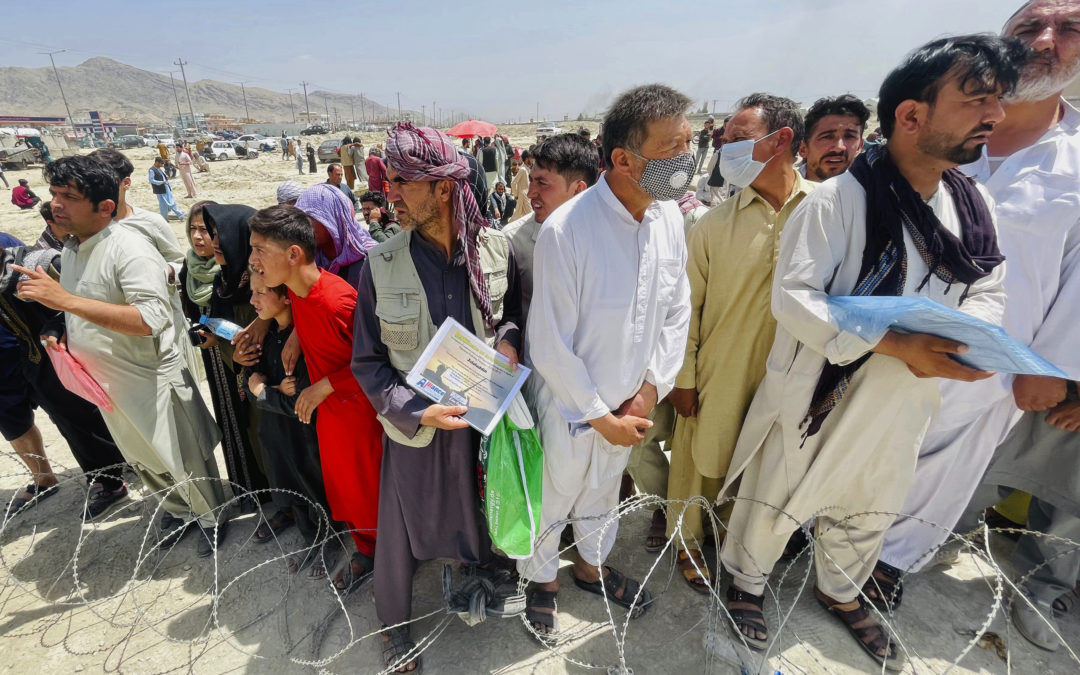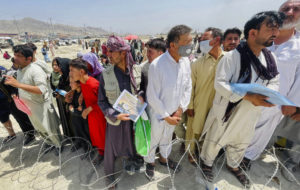
by Emily McFarlan Miller, RNS | Aug 19, 2021 | Headline News |

Hundreds of people gather near the international airport in Kabul, Afghanistan, Tuesday, Aug. 16, 2021. The U.S. military and officials focus was on Kabul’s airport, where thousands of Afghans trapped by the sudden Taliban takeover rushed the tarmac and clung to U.S. military planes deployed to fly out staffers of the U.S. Embassy, which shut down Sunday, and others. (AP Photo)
by Jack Jenkins & Emily McFarlan Miller (RNS)
WASHINGTON (RNS) — President Joe Biden has authorized an additional $500 million to aid refugees from Afghanistan, pushing through the funds as the White House fends off suggestions it failed a moral test to aid those fleeing the war-torn country.
Biden approved the funds in a memorandum Monday (Aug. 16) to meet “unexpected urgent refugee and migration needs,” drawing the money from the United States Emergency Refugee and Migration Assistance Fund.
The memo, addressed to the U.S. secretary of state, stressed the funds were for “the purpose of meeting … (the) needs of refugees, victims of conflict, and other persons at risk as a result of the situation in Afghanistan.”
The president of Jewish refugee resettlement group HIAS (founded as the Hebrew Immigrant Aid Society), Mark Hetfield, said the move was expected and the fund exists “precisely for this type of situation” — referring to the effort to evacuate Afghans desperate to leave the country after it fell to the Taliban over the past week.
The White House did not immediately respond to questions about how the new funds will be used.
At a news conference Tuesday afternoon, White House press secretary Jen Psaki told reporters that seven C-17 aircraft left Afghanistan over the past 24 hours, carrying 700 to 800 passengers, most of them a “mix” of people from other countries and Afghans seeking a Special Immigrant Visa, or SIV, with the U.S.
Psaki also reiterated the claim that “a good chunk” of SIV applicants “did not take advantage of those visas and depart” before the Taliban took control of Kabul, as the president asserted in his Monday address on Afghanistan — although she did not specify how many.
On Monday, in response to Biden’s address, leaders of several faith-based refugee groups disputed this account, saying they spent months urging the White House to expedite the evacuation of Afghans who aided the U.S. government during its 20-year presence in the country.
“We have been in touch with countless SIV recipients who have been desperate to leave Afghanistan for months and have not been able to due to insufficient financial resources and inadequate flight accessibility through international organizations,” Krish O’Mara Vignarajah, head of Lutheran Immigration and Refugee Service, said on Monday.
Similarly, Hetfield described Biden’s assertion as a case of “blaming the victim.”
Afghan government collapses, Taliban seize control: 5 essential reads
On Tuesday, faith-based groups continued their pressure on the White House to help U.S. allies and other vulnerable Afghans, including Christians and other religious minorities.
Among them, the Evangelical Immigration Roundtable sent a letter to Biden signed by leaders from World Relief, the Council for Christian Colleges and Universities, the National Association of Evangelicals, the Ethics and Religious Liberty Commission of the Southern Baptist Convention and the National Latino Evangelical Coalition.
“As Christians, we believe that each person is made with intrinsic value in the image of God, and we cannot treat any person’s life as expendable. Our government has a particular obligation to those who are now facing threats upon their lives due to their service to the United States, and to go back on our commitment to them would be a moral failing with reverberating consequences for decades to come,” the letter read in part.
Emily McFarlan Miller reported from Chicago.
by Catherine Newhouse | Dec 14, 2011 | Feature, Headline News |

REMEMBERING THE TRAGEDY: A Rwandan genocide survivor visits the Gisozi memorial in Kigali, Rwanda, where he views pictures of some of the 800,000 people killed in his nation's 1994 massacre. (Photo: Radu Sigheti/Newscom)
When I studied abroad in Rwanda in July, friends and family expressed concern for my safety. To them, Rwanda conjured images of genocide that tore through this small African country in 1994.
Now, after learning about what happened during the genocide, their concern seems terribly ironic. Because if anything like the genocide were to happen again, my American passport would have gotten me a seat on the next plane home. I never would have been in any danger.
But I can’t say the same for the people I met in Rwanda: fellow students I took classes with, pastors I interviewed, street children I gave food to, and the leaders and scholars who lectured for our class. People who were like me, sharing my passion for ministry or my hope to make a difference, but without the American passport.
When the Rwandan genocide began in April 1994, Americans and other Westerners were immediately evacuated, while the most vulnerable people—the Tutsi being targeted, and the Hutu moderates who stood up for them—were abandoned.
The international forces that poured in to evacuate foreigners could have stopped the genocide right then if they’d teamed up with UN peacekeepers and other nearby troops. But they didn’t. And 100 days later, a million people were dead.
Seventeen years after the genocide, Rwanda is now one of the safest countries in Africa. But in other parts of the world still experiencing conflict, this scenario is not so far from the horrifying truth of what could happen when crisis hits: foreigners are saved, and Africans are not.In Rwanda, the killers were sharpening their machetes and waiting for the evacuation team to do their job, so they could close in on their victims without interference. The message to Rwandans was disturbingly clear: you were only getting on a UN rescue truck if you had that passport—or, in plainer words, if your skin was white.
“Mass slaughter was happening, and suddenly there in Kigali we had the forces we needed to contain it, and maybe even stop it,” UN General Romeo Dallaire told journalist Samantha Power in The Atlantic’s “Bystanders to Genocide.” “Yet they picked up their people and turned and walked away.”

ABANDONING RWANDA: The extremist Hutu militia killed 10 Belgian soldiers at this site to scare Belgium out of Rwanda. Belgium pulled its soldiers from the UN peacekeeping mission, severely reducing its force. The bullet holes are still visible at this former military camp, now a memorial in Kigali. (Photo by Tyler Hutcherson)
You can’t help but ask the difficult questions: Why were foreigners saved and Africans abandoned, when their lives are just as valuable? Why didn’t the rest of the world pull their troops together to save a million lives, rather than just rescuing the Westerners, calling the mission a success, and getting out?
I think of watching Beyond the Gates, a fictional movie about the Rwandan genocide, and listening to a white journalist compare her experiences seeing death in different countries. “When I was in Bosnia, I cried every day,” this character said. “I looked at the white faces of women dead in the gutter and thought, ‘That could be my mother.’ In Rwanda, I look at the bodies and I think, ‘It’s just dead Africans.’”
Looking back at what happened in Rwanda, I can’t help but wonder if a similar lack of empathy enabled the rest of the world to turn its back on Rwanda, reasoning that the people they left behind after the evacuation were “just dead Africans.” Has American culture become so numb to the suffering of Africans that it sees their continent as a lost cause? How can we help Americans see Africans as brothers and sisters in Christ, people who could be our family?
As I left the genocide memorials, I often felt empty, dead inside. I wasn’t sure I was capable of feeling even a fragment of the horror that happened there—let alone put it into words. Because there are some things that can’t be put into words, that are so mind-blowing that to even begin to describe them would be to trivialize the truth.
In such moments, it can be tempting to shut down emotionally, because although we may feel empathy, it seems that there’s not much we can do to put it to use. And so it’s all too easy to discard it, and move on.
I wonder what would happen if we instead clung to our empathy, aching and trusting that God can understand even when we have no words and don’t know what to do. As Romans 8:26 puts it, “We do not know what we ought to pray for, but the Spirit himself intercedes for us with groans that words cannot express.”
Because if we hold on to our empathy and cry out to God when we feel helpless, maybe we won’t give up so easily. Maybe we’ll open our eyes and see that a million lives could be saved. And then maybe we’ll use our voice as a church to do something about it.
CONFLICTS IN AFRICA TODAY:
• South Sudan’s foreign minister is warning that Sudan and South Sudan are “on the brink of war” after border violence, and the UN said Tuesday the fighting has displaced about 417,000 people. “If that conflict explodes, it would easily become the largest conventional war on the face of the earth,” wrote George Clooney and John Prendergast in a TIME article about famine as a weapon in Sudan.
• In Somalia, 250,000 people are still facing famine. The Islamist militant group Al-Shabaab has worsened the crisis, recently ordering 16 humanitarian aid agencies to leave Somalia, including the World Health Organization and UNICEF. The New York Times has disturbing photographs of the crisis—and one glimpse of hope, a photograph of one child giving another child a drink.
What’s the duty of the American church now? Is your church taking action to help stop violence and famine in Africa?





